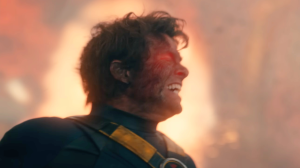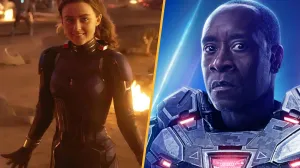Comic book tie-ins are a weird beast. At the right time and with the right creative team, they can provide a fascinating or desperately-needed window into your favorite movies or television shows, bringing to life moments that live-action or animation might not have been able to pull off. But at the worst time, a licensed or tie-in comic can range from middling to unremarkable to downright destructive, further shaping the canon in ways that don’t stick the landing. Earlier this week, we highlighted some of the best and most charming tie-in comics inspired by existing movies and TV shows — and now it’s time to focus on the opposite side of the coin.
Videos by ComicBook.com
With that in mind, here are eight tie-in comics that stand out for missing the mark in some capacity, either by losing what made the original franchise so great or by trying to adapt something that didn’t quite translate into the medium of comics. Some entries on this list almost fall into the “so bad, they’re good” category, while others are probably best left avoided.
Mad Max: Fury Road

Mad Max: Fury Road is undeniably one of the best films of the past decade, wowing a lot of fans and getting nominated for major awards for its bombastic and feminist take on a post-apocalyptic future. This made the official tie-in comic miniseries for the movie – which was published by Vertigo across the summer of 2015 – all the more of a disappointment. While there are some moments to celebrate within the four-issue run, which serves as a prequel to the overall event, the issue centered around Charlize Theron’s Imperator Furiosa was glaringly problematic.
The issue tried to shine a light on the horrific backstory of abuse that happened to Furiosa and the Five Wives, but did so in a way that felt diametrically opposed to the way those characters were portrayed in the actual film. It undoubtedly left a bad taste in fans’ mouths — but hopefully, the upcoming Furiosa prequel film can help retcon a lot of that.
Marvel’s Ant-Man and the Wasp Prelude

Comic fans have grown to expect some sort of prelude or tie-in comic around various installments in the Marvel Cinematic Universe, and a lot of them have ranged from enjoyable to just okay. The prelude to 2019’s Ant-Man and the Wasp somehow fell into an entirely new category altogether, taking the concept of recapping previous MCU installments and making something rather uninventive with it.
The narrative was catered to those who completely forgot or didn’t see the first Ant-Man movie, and the art ventured from cartoony to unflattering. To an extent, the comic failed the very ethos of an MCU tie-in comic — to make fans excited to see the movie it’s promoting.
Ghost Whisperer

Yes, the mid-2000s procedural series Ghost Whisperer earned its own comic series. And yes, the end result was just as baffling as you would probably expect. The series, which was published by IDW
While the series had a good creative team on board – including Elena Casagrande, whose work on Marvel’s current Black Widow run is phenomenal – the Ghost Whisperer comic never proved to be inventive enough or engrossing enough to help its case.
Avatar: Tsu’tey’s Path

It’s been over a decade since James Cameron’s Avatar first debuted, and with a few years still to go until the second of four planned sequels arrives in theaters, there’s some doubt regarding the franchise’s long-term staying power. Comic series like Avatar: Tsu’tey’s Path definitely don’t help that cause, trying to shed light on a character who is barely memorable in the original film.
The prequel series has some moments of good art, but it executes its premise pretty flatly, culminating in his death in the final-act battle of the first Avatar movie. While there’s arguably still story to be mined from Cameron’s expansive sci-fi universe, Tsu’tey’s Path might not be the best example.
ALF

Yes, ALF has become a sort of pop-culture icon in the decades since his sitcom debut — but surprisingly, the oddly cuddly creature didn’t translate well into the world of comics. The series, which was published by Marvel beginning in the late 1980s, managed to stretch for fifty issues, and did some genuinely baffling things along the way.
While ALF definitely has an aesthetic that feels tailor-made for the world of comics, the series got a bit too absurd for its own good, losing some of the magic of the fish-out-of-water concept of the original series.
Happy Days

Another sitcom that found its its way into comics – with middling success – was the 1970s series Happy Days. The six-issue run of Gold Key Comics’ series tried to tell stories on par with the original series, but was plagued by art that left a lot of things to be desired.
While a Happy Days comic adaptation could have easily been a worthy successor to the world of Archie, this run really just left diehard fans scratching their heads.
Galaxy Quest: The Journey Continues

Speaking of “leaving fans scratching their heads”, the 2015 series Galaxy Quest: The Journey Continues definitely shares that qualifier. As the closest fans have gotten to a long-awaited sequel to 1999’s Galaxy Quest, there was a lot of anticipation surrounding it, but it was too baffling to be really remarkable. The art didn’t mirror the original film’s characters, and the plot quickly felt inconsequential.
At least fans still have hope that the Galaxy Quest TV show could someday see the light of day.
2001: A Space Odyssey

In theory, Jack Kirby bringing to life a profound and dense cosmic odyssey would be an immediate slam dunk. Yes, there are elements that work incredibly well in his 2001: A Space Odyssey series, an eleven-issue run that was famously regarded as a way for Marvel to get Kirby back in house after his tenure at DC. But as much as the series plays right into the spirit of Stanley Kubrick’s iconic film, it also goes completely against it, throwing lengthy and heavy stretches of text into an adaptation of a not-dialogue-heavy movie.
There are undoubtedly elements of his 2001: A Space Odyssey series that definitely are worth celebrating, and it did, weirdly, help lead to the creation of the Marvel character Machine Man. But Kirby’s run on the title ultimately became its own beautiful and unique beast, as opposed to being an ideal adaptation of Kubrick’s film.








